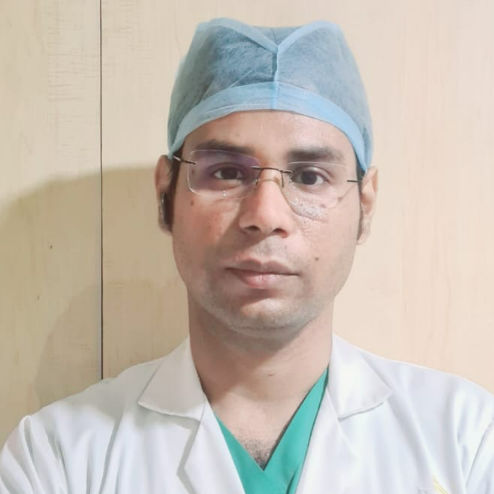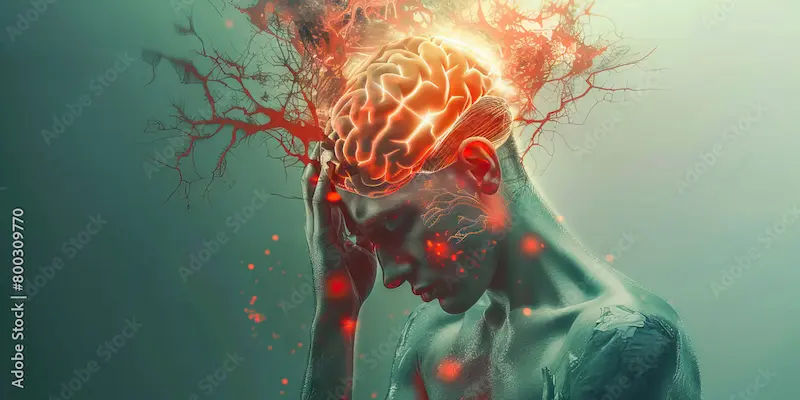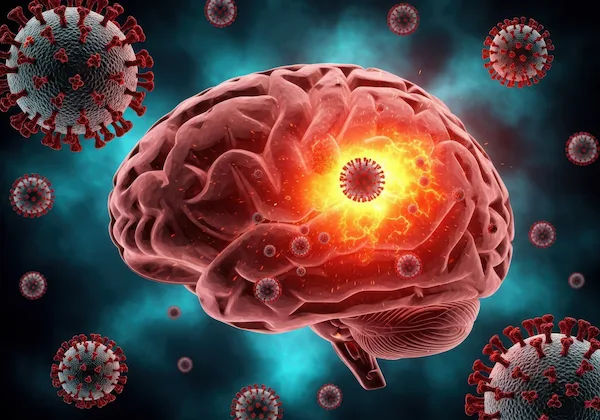Brain Infection What Leads To The Signs, And What To Do Next
Learn about the causes, early warning signs, diagnosis, treatment, and prevention of brain infections in adults and children. Know when to seek urgent medical care.

Written by Dr. J T Hema Pratima
Reviewed by Dr. Rohinipriyanka Pondugula MBBS
Last updated on 13th Jan, 2026

Introduction
A brain infection can progress from subtle symptoms to a serious medical emergency quickly. Recognising the signs—such as severe headache, fever, neck stiffness, confusion, seizures, or sudden behaviour changes—can help you act fast. Brain infections may involve the brain tissue (encephalitis), its protective layers (meningitis), or form a pocket of pus (brain abscess). They often start elsewhere in the body and spread through the bloodstream or from nearby areas such as the ear, sinuses, or teeth. Causes can be viral, bacterial, or fungal.
This guide explains how brain infections develop, early warning signs you should never ignore, how doctors diagnose and treat them, and practical steps to prevent infection. It also provides guidance for children, older adults, pregnant individuals, and those with weakened immunity, as well as clear advice on when to seek urgent care. Early evaluation and treatment significantly improve outcomes, so prompt action can be lifesaving.
What Is a Brain Infection?
Here’s an overview of what constitutes a brain infection:
A brain infection involves the central nervous system and may affect:
• Brain tissue itself (encephalitis)
• Protective membranes around the brain and spinal cord (meninges, causing meningitis)
• A localized collection of pus in the brain (brain abscess)
• The ventricular system or subdural space
Meningitis can be bacterial or viral, with bacterial meningitis being a medical emergency. Encephalitis is often viral, though autoimmune causes are possible. Brain abscesses usually result from bacterial spread from nearby infections or through the bloodstream.
Meningitis vs Encephalitis
Meningitis generally causes severe headache, fever, neck stiffness, and light sensitivity, while encephalitis is more likely to cause changes in behaviour, confusion, or seizures due to inflammation of brain tissue.
Brain Abscess
Often presents with headache, fever, focal neurological deficits (such as weakness or speech difficulty), and sometimes seizures. Symptoms may develop over days to weeks.Consult Top Specialists
Early Signs and Red Flags You Shouldn’t Ignore
Here’s what to watch for:
Typical early symptoms that may signal a brain infection include:
• Severe, persistent headache, often different from usual headaches
• Fever, chills, and feeling very unwell
• Neck stiffness, photophobia (light sensitivity), nausea and vomiting
• Confusion, irritability, personality change, or drowsiness
• Seizures or fainting episodes
• New weakness, numbness, speech problems, or vision changes
• Rash or severe body aches
Infants may show subtle signs such as poor feeding, irritability, high-pitched cry, fever or low temperature, bulging fontanelle, vomiting, seizures, or lethargy. Older adults and immunocompromised individuals may present mainly with confusion or gradual decline.
Red flags indicating urgent evaluation:
• Headache with fever and neck stiffness
• New seizures or fainting
• Confusion, behaviour changes, or rapidly worsening headache
• Severe headache with rash or vomiting and photophobia
• Any neurological deficit (weakness, slurred speech, facial droop)
What Leads to the Signs: How Brain Infections Start and Spread
Here’s how infections reach the brain:
• Bloodstream (haematogenous): Pathogens travel from a distant site, such as pneumonia, skin infection, or endocarditis, causing fever, headache, and sometimes focal deficits if an abscess forms.
• Contiguous spread: Infections from nearby structures—like chronic sinusitis, otitis media, or dental abscess—can extend to the brain, causing local pain, worsening headache, fever, or neurological deficits.
• Direct inoculation: Head trauma, neurosurgery, or devices like ventricular catheters may introduce infection, presenting with fever and signs of increased intracranial pressure.
Risk factors: Age extremes, immunocompromise, chronic ear/sinus disease, dental infections, congenital heart disease, lack of vaccination, and exposure to mosquito-borne viruses or Listeria.
From Ear, Sinus, or Dental Problems to Brain Infection
Here’s why local infections matter:
• Otitis media and mastoiditis: Especially in children or chronic ear disease, may spread to the brain, causing severe headache, fever, and sometimes facial nerve or hearing changes.
• Sinusitis: Frontal or sphenoid sinusitis can lead to frontal lobe abscesses. Symptoms include persistent headache, fever, congestion, tenderness, confusion, vomiting, or focal deficits.
• Dental infections: Untreated abscesses can reach the brain via venous drainage, presenting with headache, fever, and sometimes jaw or facial pain before neurological signs.
Warning patterns:
Persistent or worsening local infection with new neurological signs indicates urgent care.
When to Seek Urgent Care and What to Expect
Here’s what you should do:
Go to emergency care if you have:
• Headache with fever and stiff neck
• New seizure, fainting, or severe confusion
• Severe headache with rash, vomiting, or light sensitivity
• Sudden weakness, slurred speech, or vision loss
At hospital, expect rapid vital and neurological assessment, blood tests, imaging (CT/MRI), lumbar puncture if safe, and empiric treatment starting immediately.Consult Top Specialists
How Doctors Diagnose a Suspected Brain Infection
Here’s what doctors use:
• MRI or CT: Identify inflammation, swelling, or abscesses
• Lumbar puncture: CSF analysis for cells, protein, glucose, and viral PCR
• Blood cultures: Guide antibiotic therapy
• EEG: Used for seizures or encephalopathy
• Additional tests: TB, fungal, toxoplasma, or arboviral serologies in special cases
Lumbar puncture may be deferred if imaging suggests a mass lesion or raised intracranial pressure.
Treatments That Save Brain and Life
Here’s the approach:
• Bacterial meningitis: Immediate IV antibiotics, sometimes with dexamethasone
• Herpes encephalitis: IV acyclovir started promptly
• Brain abscess: Targeted IV antibiotics for 4–8 weeks, with neurosurgical drainage if needed
Supportive care includes seizure management, monitoring intracranial pressure, and careful fluid and electrolyte balance. Early treatment greatly improves outcomes.
Recovery, Complications, and Rehabilitation
Here’s what to expect after treatment:
Lingering effects can include cognitive changes, mood changes, fatigue, hearing loss, seizures, coordination problems, headaches, and sleep disturbances. Rehabilitation may involve cognitive therapy, audiology, physical and occupational therapy, and speech therapy.
Special Populations: Children, Pregnancy, Older Adults, and Immunocompromised
Here’s key information:
• Children: Neonates and infants may show non-specific signs; Group B Streptococcus, E. coli, Hib, and pneumococcus are common causes
• Pregnancy: Higher risk of Listeria; fever and headache require prompt evaluation
• Older adults: Atypical or muted symptoms, higher complication risk; Listeria risk requires tailored antibiotics
• Immunocompromised: Opportunistic infections such as toxoplasmosis, cryptococcal meningitis, or CMV encephalitis are more likely
Prevention That Works
Here’s what you can do:
• Vaccinations: Hib, pneumococcal, meningococcal, and travel vaccines as indicated
• Treat ear, sinus, and dental infections promptly
• Practice safe food handling
• Use mosquito protection and seek immediate care for animal bites
Myths vs Facts About Brain Infection
Here’s the reality:
• Not all severe headaches are brain infections, but headache with fever, neck stiffness, confusion, or rash is a red flag
• Antibiotics do not treat viral encephalitis
• Treatment should start immediately for suspected bacterial meningitis or herpes encephalitis
• Brain infections can affect young, healthy individuals
What Caregivers Can Do While Seeking Help
Here’s guidance:
• Keep the person safe during confusion or seizures
• Record symptom timelines, medications, recent infections, and travel
• Avoid delaying care with sedatives
• Bring essential medical information to the hospital
Costs, Access, and Care Pathways in India
Here’s what to know:
• Emergency services provide rapid access to imaging and lumbar puncture
• Telehealth triage can save critical time
• Home collection for basic labs is possible, but suspected brain infection requires hospital testing
• Ask about insurance, government schemes, and financial counselling early
Conclusion
A brain infection is a time-critical condition. Severe headache, fever, stiff neck, confusion, seizures, or sudden neurological changes reflect how infection affects the brain. Many infections start as minor problems like ear, sinus, or dental issues. Diagnosis involves imaging and CSF testing, while treatment may include urgent antibiotics, antivirals, or surgery. Early intervention improves recovery chances. Prevention through vaccination, prompt care of local infections, and everyday safety measures reduces risk. Seek urgent medical attention if a brain infection is suspected, and use online consultations for rapid triage when symptoms are mild or unclear.Consult Top Specialists
Consult Top Specialists

Dr. Aditendraditya Singh Bhati
Neurosurgeon
21 Years • MBBS(2004), DNB Neurosurgery(2014); MNAMS; Fellow Skull Base Endoscopy (Italy), Fellow Extended Skull Base ( Weill Cornell, USA), Fellow ZAP-X Radiosurgery. Member of American Association of Neurological Surgeons
Delhi
Apollo Hospitals Indraprastha, Delhi
(100+ Patients)

Dr. Ganeshgouda Majigoudra
Neurologist
10 Years • MBBS, MD ( GENERAL MEDICINE) DM (NEUROLOGY)
Bengaluru
Apollo Clinic, JP nagar, Bengaluru

Dr. E Prabhakar Sastry
General Physician/ Internal Medicine Specialist
40 Years • MD(Internal Medicine)
Manikonda Jagir
Apollo Clinic, Manikonda, Manikonda Jagir
(150+ Patients)

Dr Debnath Dwaipayan
Neurosurgeon
9 Years • MBBS, MS(Gen. Surgery), DrNB (Neurosurgery)
Delhi
Apollo Hospitals Indraprastha, Delhi

Dr. Anusha D
Neurologist
16 Years • MBBS, MD, DM (Neuro), DNB (Neuro)
Chennai
Apollo Speciality Hospitals OMR, Chennai
(125+ Patients)
Consult Top Specialists

Dr. Aditendraditya Singh Bhati
Neurosurgeon
21 Years • MBBS(2004), DNB Neurosurgery(2014); MNAMS; Fellow Skull Base Endoscopy (Italy), Fellow Extended Skull Base ( Weill Cornell, USA), Fellow ZAP-X Radiosurgery. Member of American Association of Neurological Surgeons
Delhi
Apollo Hospitals Indraprastha, Delhi
(100+ Patients)

Dr. Ganeshgouda Majigoudra
Neurologist
10 Years • MBBS, MD ( GENERAL MEDICINE) DM (NEUROLOGY)
Bengaluru
Apollo Clinic, JP nagar, Bengaluru

Dr. E Prabhakar Sastry
General Physician/ Internal Medicine Specialist
40 Years • MD(Internal Medicine)
Manikonda Jagir
Apollo Clinic, Manikonda, Manikonda Jagir
(150+ Patients)

Dr Debnath Dwaipayan
Neurosurgeon
9 Years • MBBS, MS(Gen. Surgery), DrNB (Neurosurgery)
Delhi
Apollo Hospitals Indraprastha, Delhi

Dr. Anusha D
Neurologist
16 Years • MBBS, MD, DM (Neuro), DNB (Neuro)
Chennai
Apollo Speciality Hospitals OMR, Chennai
(125+ Patients)
Consult Top Specialists

Dr. Aditendraditya Singh Bhati
Neurosurgeon
21 Years • MBBS(2004), DNB Neurosurgery(2014); MNAMS; Fellow Skull Base Endoscopy (Italy), Fellow Extended Skull Base ( Weill Cornell, USA), Fellow ZAP-X Radiosurgery. Member of American Association of Neurological Surgeons
Delhi
Apollo Hospitals Indraprastha, Delhi
(100+ Patients)

Dr. Ganeshgouda Majigoudra
Neurologist
10 Years • MBBS, MD ( GENERAL MEDICINE) DM (NEUROLOGY)
Bengaluru
Apollo Clinic, JP nagar, Bengaluru

Dr. E Prabhakar Sastry
General Physician/ Internal Medicine Specialist
40 Years • MD(Internal Medicine)
Manikonda Jagir
Apollo Clinic, Manikonda, Manikonda Jagir
(150+ Patients)

Dr Debnath Dwaipayan
Neurosurgeon
9 Years • MBBS, MS(Gen. Surgery), DrNB (Neurosurgery)
Delhi
Apollo Hospitals Indraprastha, Delhi

Dr. Anusha D
Neurologist
16 Years • MBBS, MD, DM (Neuro), DNB (Neuro)
Chennai
Apollo Speciality Hospitals OMR, Chennai
(125+ Patients)
More articles from Brain Infection
Frequently Asked Questions
1) What’s the difference between meningitis and encephalitis?
Meningitis inflames protective membranes and usually causes severe headache, fever, and neck stiffness. Encephalitis inflames brain tissue itself, often causing confusion, behaviour changes, or seizures. Both can occur together (meningoencephalitis).
2) Can a sinus infection spread to the brain?
Yes. Frontal or sphenoid sinusitis can extend into the cranial cavity, causing a brain abscess or meningitis. Warning signs include worsening headache, fever, confusion, or focal neurological deficits.
3) How are brain infections diagnosed?
Diagnosis involves clinical examination, blood tests, imaging (CT/MRI), and often lumbar puncture for CSF analysis and PCR. Treatment may start before all results are back to protect brain function.
4) What treatments are used for brain infection?
Empiric IV antibiotics for bacterial meningitis, IV acyclovir for suspected herpes encephalitis, antifungals when indicated, dexamethasone in some bacterial cases, seizure management, and sometimes neurosurgical drainage for a brain abscess.
5) When should I seek emergency care for a possible brain infection?
Seek urgent care if you have headache with fever and stiff neck, new seizures, confusion, rash with headache, or any sudden neurological deficit. If symptoms persist beyond two weeks or worsen, consult a doctor online or visit a healthcare facility.


